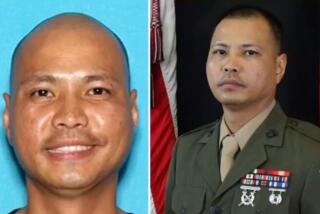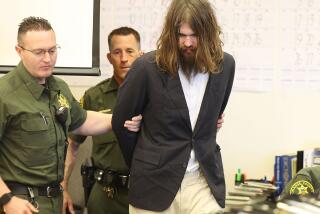Rules sometimes don’t apply to war in Iraq, Marine jury told
It took a Marine jury less than two hours to decide that after 2,627 days behind bars, Sgt. Lawrence Hutchins had been punished enough for killing an unarmed Iraqi man in 2006.
The jury’s sentence Thursday: a bad-conduct discharge and time-served. Prosecutors had asked the jury to impose a dishonorable discharge and additional time in prison, possibly close to four years.
During a daylong penalty phase hearing, jurors heard blunt testimony from a staff sergeant and a major suggesting that, in Iraq, following the official rules of engagement is not always a strategy for coming home alive.
By custom, Marine juries do not discuss their verdicts publicly so it is unknown what influence certain testimony might have had. The jurors – three officers and three senior enlisted personnel – are all veterans of Iraq and Afghanistan, or both.
The two witnesses were Staff Sgt. Saul Lopez and Maj. Zaher Bouza, both veterans of multiple combat deployments.
Lopez served with Hutchins in Hamandiya, Iraq, but was not part of the squad that later was charged with murder. Bouza was born in the Middle East and has made 10 deployments as a Marine to the region, including one to Iraq that concluded only weeks ago.
Both were called by the defense as the jury prepared to decide on Hutchins’ sentence after convicting him of unpremeditated murder for his role in dragging an Iraqi from his home and riddling him with bullets. Hutchins admits firing three rounds into the victim’s head.
The rules of engagement may not always apply in Iraq, Bouza testified. “It’s not a black-and-white situation, not a conventional type warfare,” he said.
Sending young troops – Hutchins was 22 – into a complex land rife with violence is inviting problems, Bouza said. The U.S. expectations of how to succeed in Iraq may display a fundamental misunderstanding of an insurgency, he said.
“If it was simple we wouldn’t be in the war after 14 years,” he said. “We still don’t get it.”
Hutchins and other squad members involved in the killing, Bouza said, “were trying to solve a complex, difficult problem that went awry.”
Hutchins, 31, was convicted in 2007, but an appeals court in 2013 overturned the verdict and the case returned to Camp Pendleton for retrial. He has been free since the case was overturned.
Lopez said that, if asked, he would have joined Hutchins’ squad the night it went to find a suspected terrorist leader in his home and kill him as a warning to other Iraqis not to attack Americans. The prevalence of enemy snipers and roadside bombs had left the Marines with a sense of doom, he testified.
“I felt my days were numbered, a lot of us felt that way,” Lopez said. “We were waiting to die.”
Marine training had not prepared troops for the viciousness of an insurgency, said Lopez, assigned to walk as the point man during foot patrols.
“The reality is you have to adapt to the enemy to survive,” he said.
After the killing, attacks against Marines declined, Lopez said. “Everything was really quiet,” Lopez said.
Marines credited Hutchins, the squad leader, he said.
One of the prosecutors, Maj. Samson Newsome, protested that Lopez was suggesting an “ends justify the means” rationale.
“Do you know that every Marine who participated is now a convicted felon?” he asked forcefully.
“They’re alive, sir,” Lopez answered.
For more San Diego area news, follow @LATsandiego.
More to Read
Sign up for Essential California
The most important California stories and recommendations in your inbox every morning.
You may occasionally receive promotional content from the Los Angeles Times.









